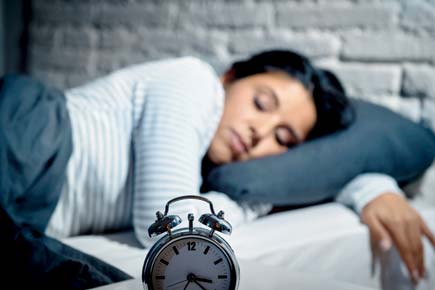We must sleep well in order to dream well. This we know. Now, an American researcher says we must dream well in order to sleep well. Dr Rubin Naiman on what dream deprivation can do to us

Cultures across the world have spent time discussing what the significance of various dreams are. Death is often seen as fear of loss rather than the clairvoyance of one or beginning of something new. Different animals signify different turns in life. In the modern day, however, sharing dreams is not much encouraged except with close friends or family.

Here's where Dr Rubin Naiman thinks we're going wrong. Naiman, a sleep and dream specialist at the University of Arizona Center for Integrative Medicine, says in an email interview: "I believe sharing dreams is a natural human instinct which we would all feel if we didn't rush off into our day. There's great personal value in sharing our dreams."
Naiman is in the news for a paper titled: Dreamless: the silent epidemic of REM sleep loss. Rapid Eye Movement refers to the period during which your eyes move quickly in different directions, dreams typically occur during REM sleep. In the paper, Naiman claims that the modern day population is as dream deprived as it is sleep deprived. And, while it's now agreed upon that sleep deprivation is harmful tothe body, dream deprivation is equally so.
Edited excerpts from an interview with Naiman.
What got you interested in the subject of dreams as something that might affect human health?
Since I was a child, I have believed that dreams are meaningful. As a professional, I worked extensively with cancer patients and found that dreaming played a critical role in their health.
What role does dreaming play in our body's functioning?
In one sense, dreaming takes the body off-line. In deep sleep, the body and brain are deeply relaxed but our voluntary muscles or not. In REM sleep when dreaming, our voluntary muscles are temporarily paralysed, providing a greater depth of rest. When the body is off-line, the brain processes experiences we've had during
the day.
What is a typical sleep pattern? For instance in an eight-hour sleep, when do we get REM sleep? Does the body dream even when we are not in REM?
Approximately 25 per cent of the night's sleep involves REM sleep when we're dreaming. We generally obtain most of our deep or delta sleep in the first part of the night. And, we experience most of our REM sleep and dreaming in the latter part of the night. There is evidence for dream-like experiences in non-REM sleep, but these are less cohesive dreams. REM sleep can be understood as a window through which dreaming becomes most visible.
Does everyone in REM state dream?
Generally speaking, everyone in REM dreams although most of us fail to remember our dreams.
Why do some people remember dreams and others don't?
We remember dreams for the same reason we remember anything, that is by paying attention. We live in a world where dreaming has been devalued and hence, fewer people are attending to their dreams.
Is what people dream important? There are various people who analyse what you one dreams. Does that too indicate health?
I believe that dreams are as important as waking life experiences in shaping our sense of self. This is independent of interpretation, which usually reflects theoretical frameworks that may or may not apply to the individual. There is some evidence that simply remembering dreams might help us heal from certain types of loss. I believe that all dreams, including nightmares, can represent an internal healing process. Too often, we instinctively repress the dream, potentially compromising its healing effect.

Dr Rubin Naiman
How did you conduct your research?
My research was essentially a simple review and collation of data collected over three decades.
Could you explain this: Dream eyes transcend waking egoic perspectives, opening us to greater social and spiritual consciousness and revealing a numinous world behind the world?
We typically view ordinary waking life through ordinary waking eyes. We look at the world with intention, which delimits what we see. Both, our perceptions and dreaming are much less informed by intention and more by reception. Dreams,
therefore, allow us to see the forest for the trees.
How can one get a more balanced sleep where dreaming is concerned?
The questions is simple, but the answer complex. In short, the quality of our dreams and that of our sleep are inextricably linked. We must sleep well in order to dream well and dream well in order to sleep well.
 Subscribe today by clicking the link and stay updated with the latest news!" Click here!
Subscribe today by clicking the link and stay updated with the latest news!" Click here!









